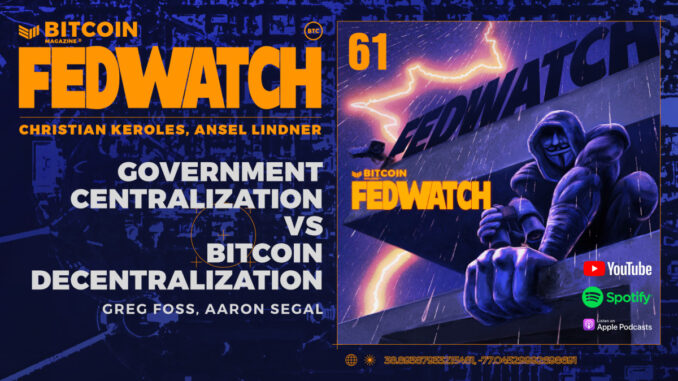
[ad_1]
Watch This Episode On YouTube
Hear To This Episode:
Hosts: Christian Keroles and Ansel Lindner
Visitors: Greg Foss and Aaron Segal
On this particular episode of Bitcoin Journal’s “Fed Watch” podcast, we sat down with two brilliant minds within the bitcoin area, Greg Foss and Aaron Segal, to debate the worldwide course of and interaction of centralization and decentralization in society. It was a type of a panel dialogue with Keroles guiding our matters.
The Present And Future Battle Between Centralization And Decentralization
Segal opened with introducing 5 axioms of centralization versus decentralization, that are the topic of an upcoming essay of his: One, the fluctuation between centralization and decentralization is among the driving forces in historical past; two, centralization and decentralization can are available in many types; three, decentralization is extra steady in the long term; 4, know-how could be helpful in both path; and 5, Bitcoin is a uniquely decentralizing pressure.
A really attention-grabbing level Segal introduced up instantly was how the system promotes the buy-in of the individuals by entangling their property into it. If you begin your profession within the U.S., you usually get advantages that embody issues like 401(okay) contributions and even inventory choices. Most individuals’s financial savings, if indirectly within the inventory market or authorities retirement plans like social safety, are in dollar-denominated investments. This results in the centralization of the system being extra sticky than one would anticipate primarily based on financial properties of competing methods, as a result of your financial savings rely upon the continued existence of the present system. Bitcoin is about the one option to unstick that funding and keep away from a messy transition.
Chinese language Economic system And Rising Centralization
The panel subsequent utilized this line of pondering to the state of affairs in China to tease out dynamics there. What adopted was certainly one of my favourite discussions in “Fed Watch” historical past. Foss identified the inadequacy of the Chinese language capital markets as small and immature. The impression of latest crackdowns by the CCP on inventory listings and firms can solely be understood in that context.
Segal added that the CCP seems to be shifting the economic system towards new industries. My contribution was to anchor this dialogue about China into the expanded decentralization debate. Nation-states will confront decentralization pressures, however so will your entire worldwide order. The earlier period of worldwide our bodies just like the World Commerce Group (WTO), UN and World Well being Group (WHO), with vital affect may even be affected by decentralization.
The Method The U.S. Is Dealing with Bitcoin’s Decentralization
The dialog then continued by analyzing the U.S. and the impact of this wave of decentralization on its society. We famous an increase in war-like rhetoric, and the way it impacts these centralization dynamics, in addition to the higher affinity to a rule of regulation. The rise in U.S. bitcoin mining and the latest proposed infrastructure invoice debate speaks to the U.S.’s place on this.
The U.S. is exclusive in that it opens up many matters. The panelists agreed that the U.S. is a deeper market and one primarily based extra in rule of regulation, so it ought to deal with this strain towards decentralization higher than most different locations. Foss and Segal mentioned passive investing as an enormous drawback, “passive investing is communism” is a direct quote from Segal. Dialog even turned to new Bitcoin group entrant Jason Lowery, a member of the U.S. House Drive, writing a dissertation on bitcoin mining as a nuclear deterrent.
As you may see, it was a packed episode, this was solely a sampling of what was coated. It’s certainly one of my favorites we’ve ever achieved and a should hear. Due to Foss and Segal for becoming a member of us. Maybe, we will proceed this matter in one other present quickly.
[ad_2]
Source link





 Bitcoin
Bitcoin  Ethereum
Ethereum  Tether
Tether  XRP
XRP  Solana
Solana  USDC
USDC  Dogecoin
Dogecoin  TRON
TRON  Cardano
Cardano
Be the first to comment